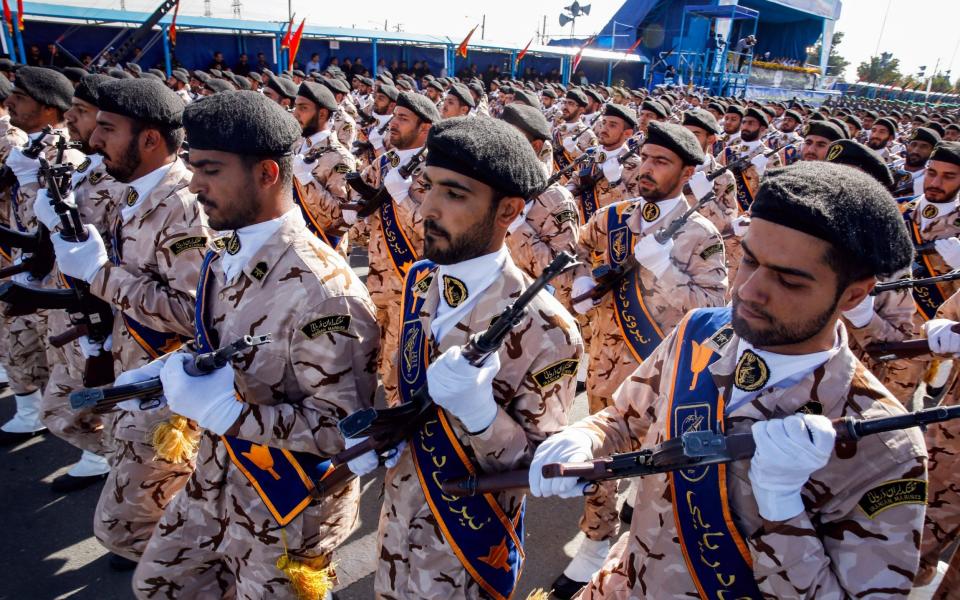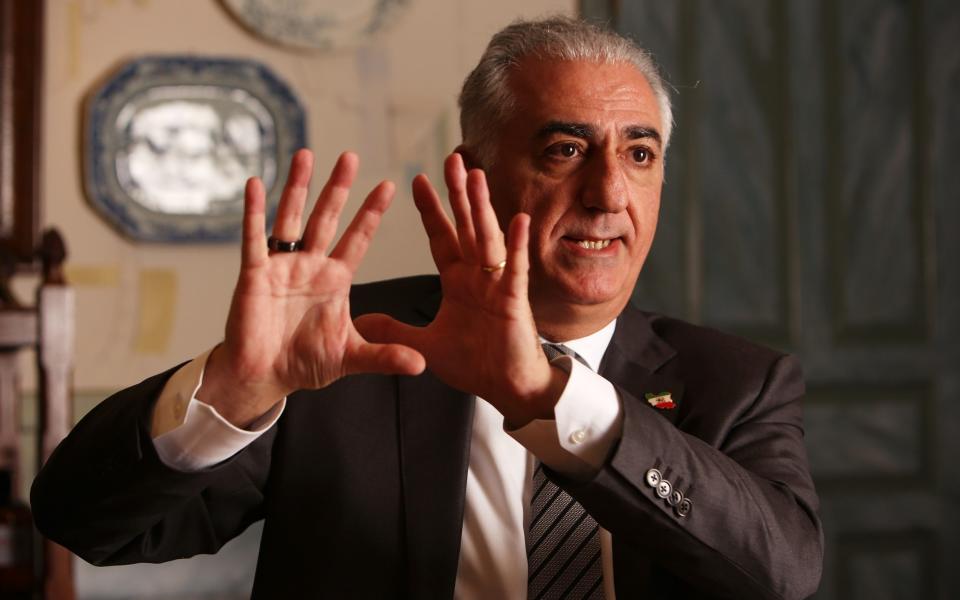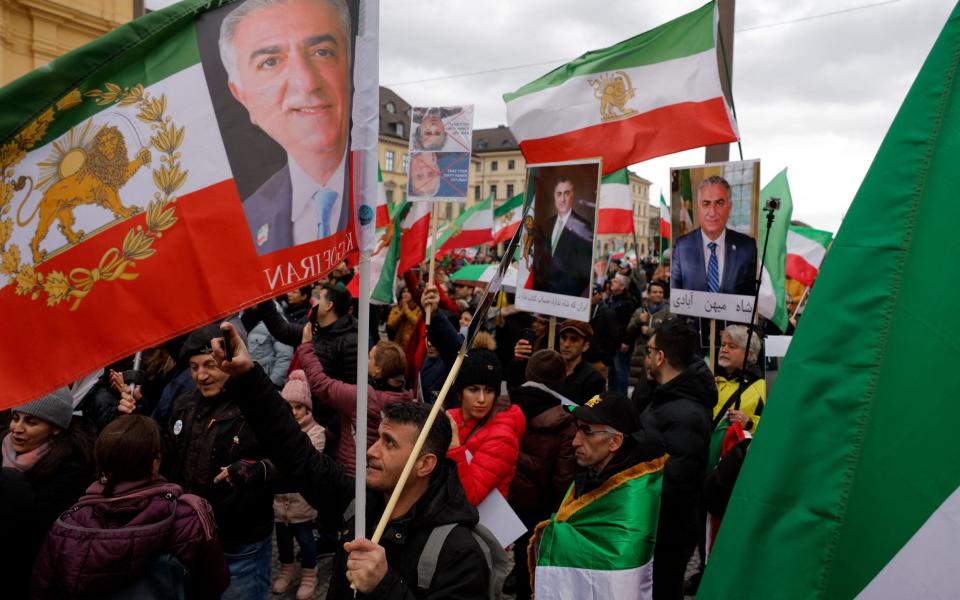Islamic Revolutionary Guard must be proscribed, says Iran's exiled Crown Prince

- Oops!Something went wrong.Please try again later.
Iran’s Crown Prince has urged the UK to proscribe the Islamic Revolutionary Guard Corps (IRGC), as arguing that this would be akin to “pulling out the biggest tooth the regime has”.
Reza Pahlavi - who is known to his most devoted followers His Imperial Majesty the Shah - has been living in exile since his father was deposed in 1979.
The prince, who is the son and heir to the last Shah of Iran, has spent almost half a century campaigning for a secular and democratic Iran and remains an important figurehead for the four million strong Iranian diaspora.
Speaking to The Sunday Telegraph during a brief trip to London, he said that when it comes to proscribing the IRGC, the West is being slow to act because it underestimates the significance of such a move.
He believes the hesitancy of the UK and other European powers to formally designate the IRGC as a terrorist organisation is perhaps because they are “yet to understand” the impact it would have domestically in Iran.

Proscribing the IRGC would mean “more pressure in paralysing the regime that is depending on this instrument of coercion at home and abroad to do the sinister deeds whether it is Syria or Lebanon, or in Iran itself,” the prince said.
But he added that it would also have the crucial effect of increasing the chance of defection from within its own ranks - and as such, help to bring about the collapse of the Islamic Republic which he believes is now only a matter of time.
‘It will send a strong message to regime’
“It will send a strong message to the regime but at the same time to those who are still part of that organisation to say, maybe it's time for us to bail out. Because as long as we are stigmatised by being associated with it, our fate is sealed,” the prince said.
“In other words, you're pulling the biggest tooth that the regime has out, you're weakening it. And weakening the regime has a direct diametric effect of strengthening the people.
“You simply are paralysing them as much as you can, limiting their capabilities while sending a very strong message to the nation and to the regime that we're not going to take this any longer.”
His intervention on the IRGC comes amid a major row in Whitehall over proscribing the group.

Proscription would make it a criminal offence to belong to the IRGC, attend its meetings, carry its logo in public or encourage support of its activities.
The IRGC was founded as an ideological custodian of Iran’s 1979 revolution but has since morphed into a major military, political and economic force in the country.
The drive to proscribe the group, first revealed by The Telegraph, has been held up by a battle in Whitehall about the wisdom of taking the approach.
Home Office officials have been building the case against the IRGC, with the security services understood to have shared intelligence.
But it is understood that discussions about proscribing the organisation stalled after James Cleverly, the Foreign Secretary, raised concerns that pressing ahead with the measure could harm British interests.
‘Death to the dictator’
The prince has spent the past week on a whistle stop tour of European cities including Munich, Paris and Brussels as well as London. He has been meeting with officials and politicians to discuss the situation in Iran, and to drum up support for regime change in Iran.
He believes that now - for the first time since the Iranian revolution - all the necessary conditions are in place for the Islamic Republic to fall. “I think the alignment of stars is now there. The opportunity is right in front of us,” he says.
Not only have the “reformists of yesteryear” from within Iran now come around to the idea of total regime change, but the West has also warmed to the idea, he explains.
“Only a year ago, they were still in the mindset of maybe we should still press for reforming the regime,” he said, referring to the regime’s domestic critics. “The same person now says, ‘it isn’t going to work’. It’s an important paradigm shift of thinking internally.
“A whole nation now calls ‘death to the dictator’ meaning an end to the regime. Before that you weren’t hearing more grievances about the lack of reform. Today the cry is a national cry for ‘let's get rid of this system, we can't take it any longer’. In other words, it's revolutionary. It's not just protests.”
There has also been an important shift in thinking abroad, he says. Attitudes have changed following the regime’s brutal repression of mass protests on the streets in Iran - prompted by the death of Mahsa Amini who was arrested by Iran’s morality police for wearing an “improper” hijab - as well as Iran’s role in supplying weapons to Russia to wage war against Ukraine.
“Today, the mindset is that we have to go beyond the regime, and the world sees that the regime is the key problem for everything associated with it - whether it's the nuclear issue, whether it's terrorism, whether it is what they're doing right now with the Russians against Ukraine,” the prince explains.
“And in that context, the evolution of thinking is that we need to have fundamental change. We need to have complete change. As long as this regime is in place, nothing is going to happen. So the domestic narrative, that of the diaspora and those of us trying to bring it to a secular democratic option - it all now ties together.”
He said there is now a “window of opportunity” to act while the world is “prepared to think about an alternative” to the regime.
Plans for new government
Such is his confidence that regime change is imminent, the prince and his supporters have already started mapping out the first 100 days of a new transitional government.
“A lot of people question what can come after, rightfully so,” he said. “But I think that Iran has all the ingredients and tools to fill the void in terms of the intelligentsia, in terms of positions that they can immediately fill for transitional governance, specialists [in] the economy, environment, transitional justice as well as constitutional law.
“What are the immediate concerns that the country will be faced with? What will the interim government need to anticipate and plan for in the first 100 days? These are the kinds of things that we can work with our western counterparts on [to ensure] that there is a plan and a strategy.”

One major issue for a new, secular government in Iran will be over the role of the military, the prince says. He points to the Nuremberg trials at the end of the Second World War, where only the top Nazi officers were prosecuted rather than going after all of those in the lower ranks.
“There's always the question of where does the army stand or where does the paramilitary element stand - can they rejoin the nation? Can they survive a regime change? Is there a place for them beyond the current regime in the future? How are they going to be reintegrated? How many of them would have to face justice? How many of them could be forgiven in a process of truth and reconciliation, how are they going to be treated under a transitional justice system?”
The prince is adamant that he does not believe in the restoration of the monarchy - instead, he wants the people of Iran to decide what kind of government there should be in the new state.
But he does regard himself as crucial to the future of Iran, not least, he says, because of the support he has within the Iranian diaspora.
“I’m not running for office or anything, but…there is certainly a viewpoint that believes that I certainly have a central role to play,” he said. “I'm not saying I'm the only one but I certainly am a critical element to bringing this coalition to a fruitful conclusion.”

Looking back to 1979, the prince described it as a “hectic” and “frenzied” time. He was already abroad - training as a pilot in Texas - when the revolution broke out and his family were forced to flee Tehran.
“I left in the summer of 1978,” he recalled. “In fact, on my way to America, I came to England. Queen Elizabeth was kind enough to host me at Buckingham Palace. I was here for about 10 days.
“And the plan was for me to go through the training and then return to Iran. But of course, the revolution happened and ever since I've been living outside of Iran.”
His memories of Iran, before he left when he was 17 years old, involve travelling around the country and carrying out official duties.
Now he is based in Washington with his family where he is a full-time campaigner for a democratic Iran. He denies reports that he has received funding from the CIA, saying this is “absolutely false” and is a false narrative, promoted by the Iranian regime in an attempt to “smear” him.
He also denies ever attempting to set up a “government in exile” with a view to reestablishing the monarch in Iran, saying this would be pointless given the de facto recognition of the current regime.
“I'm not advocating one form [of government] versus the other,” he said. “Because, to me, it's a matter of democratic principles. If the majority thinks that they need to still have an institution above and beyond the practice of governance to bring an element of stability - which is the monarchist argument - it may be an argument but that needs to be decided by the people.”
